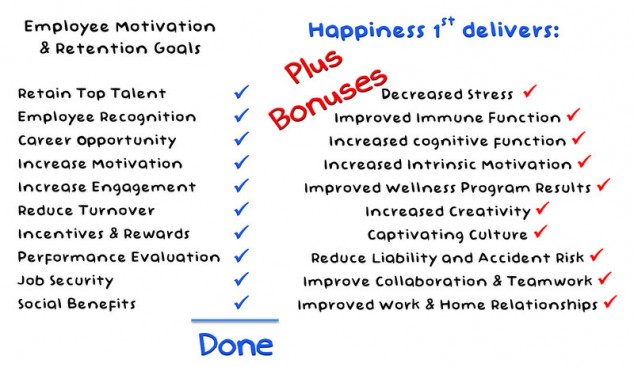Retaining and Motivating Employees
One of the greatest risks companies currently face is retaining their talent as the job market begins to feel safer to employees who have hunkered down during the down economy. They stuck with you–perhaps pulling double duty without raises–to help you weather the storm. Positions that were cut or not replaced meant a loss of institutional knowledge that now resides in the brains of fewer people, increasing the risk when key players decide to move on.
You are tasked with motivating and retaining these people. How can you do this within existing budget constraints with competing demands on corporate resources?
How do we accomplish these goals and so much more?
The root cause of motivation to do a good job and motivation to stay with a specific employer is related at the root cause. We understand how to provide employees with skills that help them self-manage their perspectives that results in better-feeling perspectives. These perspectives help you check all the boxes and a whole lot more.
For example, feeling appreciated is both a matter of the actual feedback and the perception of that feedback by the receiver. If the receiver has a negative voice in his head that refutes the truth of the positive feedback, for all intents and purposes it feels as if no feedback was given. Or,even worse, the negative voice can convince the employee that things are worse than they thought they were before the feedback.
Job Security is another area where perception really matters. I’ve worked along side people who were full of fear while I, with much greater financial responsibilities and less flexibility (i.e. single parent household) did not feel afraid at all. We provide employees with skills that help them form more realistic perspectives that invariably feel more secure. The most stable company cannot convince someone whose brain is telling them to be afraid to feel secure. The employee has to be empowered to find that perspective by understanding why they perceive it the way they do and providing skills that give them the option to find a better perspective.
Career Opportunities are part perception and part communication. I’ve seen employees leave a company where there were many opportunities but the employee perceived those opportunities as not available to her. It really boiled down to low self-esteem and self-selection as not a viable candidate–not lack of opportunity. Our program increases open communication and self-esteem.
When the root cause is addressed, the benefits flow throughout the system. We can even help you sleep better at night.

